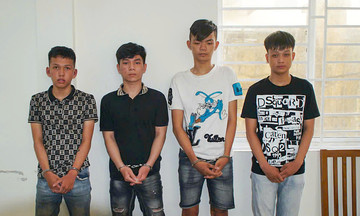Police in Quang Ninh province have disrupted two such scams in the past week, preventing families from losing money and ensuring the safe return of the students.
In the most recent case, on 21/7, a man in Vang Danh ward received a terrifying message: his daughter, a university student in Hanoi, had been kidnapped. The scammers demanded a ransom of 370 million VND.
The family received a barrage of calls from unknown numbers, filled with threats and demands for money. All attempts to contact their daughter failed. The frantic family searched for her without success and reported the incident to the police.
 |
A fake arrest warrant sent to the victim. Photo: Police Department |
A fake arrest warrant sent to the victim. Photo: Police Department
By 1 PM that same day, criminal investigators located the daughter alone in a Hanoi motel and safely reunited her with her family.
A similar incident occurred on 15/7, involving a family in Hong Gai ward. The scammers claimed their son had been kidnapped and demanded 300 million VND. They made repeated calls via Zalo, sending images of the supposed "hostage" and threatening messages. By 6 PM, police had found the son and brought him home.
Police identified a common thread in both cases: elaborate schemes targeting students.
The scams begin with a call offering a scholarship to study abroad, a tactic to gain trust and gather personal data. Then, using a different number, the scammers impersonate investigators, claiming the student is involved in money laundering or drug trafficking.
The victims are lured into online meetings on Zoom, where they see accounts labeled "Ministry of Public Security" and "Supreme People's Procuracy." They are instructed to share their phone screens for "verification" and receive fake "arrest and account freeze" warrants.
The scammers demand absolute secrecy and instruct the students to go to a nearby motel for "investigative purposes." Once isolated, their information and images are used to create videos for their families. The scammers then call the families, threatening harm and demanding ransom payments to designated accounts.
The Criminal Investigation Department warns that "online kidnapping" is on the rise and becoming increasingly sophisticated. People should remain calm when receiving calls or messages from alleged legal officials. Legitimate authorities will send official notices through local police, not demand money transfers or software installations for investigations.
Le Tan












